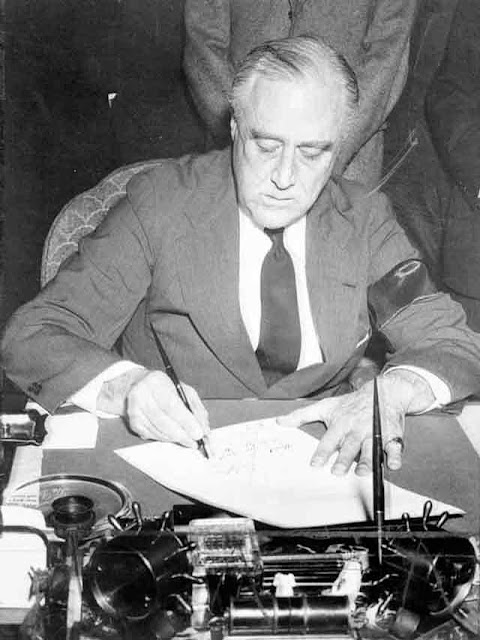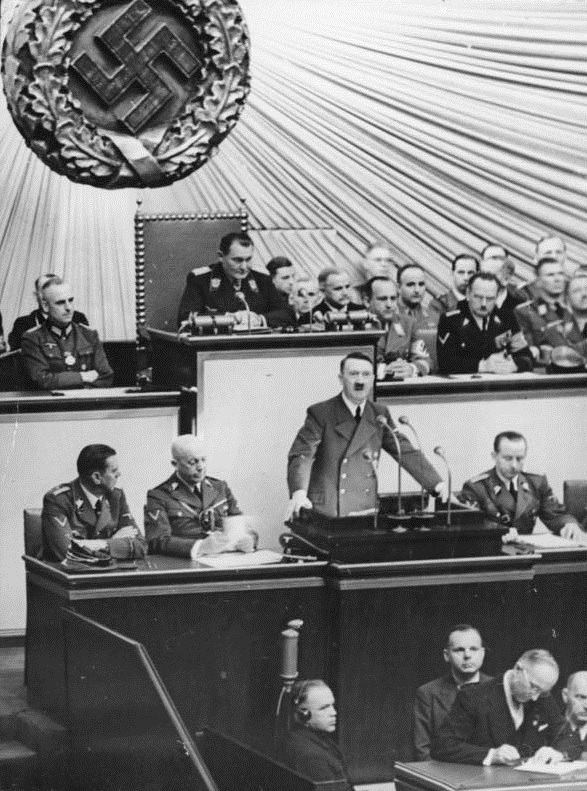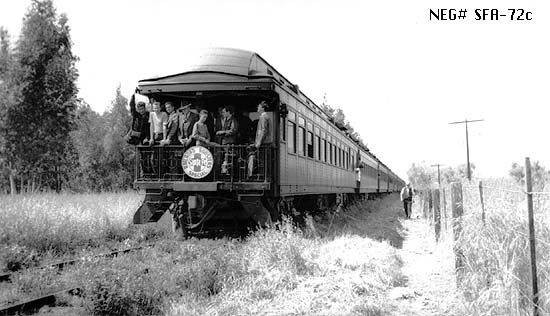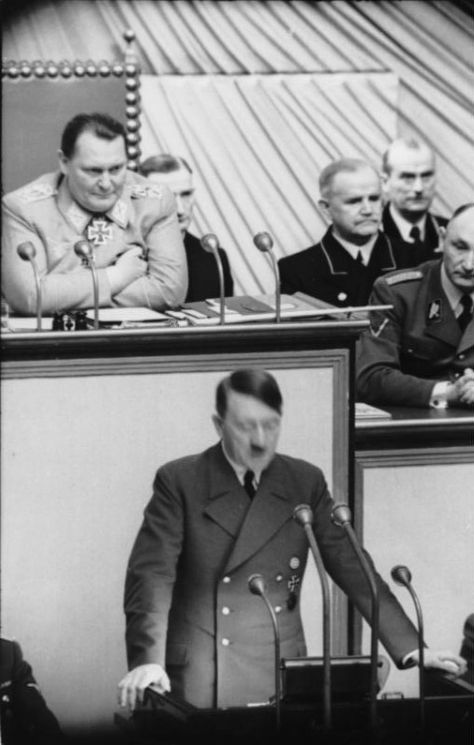Sunday 22 June 1941
 |
| German troops of Army Group South cross the Bug River on 22 June 1941. |
Eastern Front: As Adolf Hitler has planned since July 1940, the Reich invades the Soviet Union on
22 June 1941. The attack is made without a declaration of war and proceeds along a 2000-mile (2900 km) front. It is one of the greatest miscalculations in history.
The Wehrmacht has sent sappers and saboteurs across the border after dark on the 21st, and they work through the night securing bridges across key waterways and neutralizing border fortifications. These advance groups secure every single bridge across the 500-mile length of the Bug River that divides the two sides.
At about 01:00, the Soviet Stavka notifies Soviet military districts along the border to "bring all forces to combat readiness" but to "avoid any provocative actions" (NKO Directive No. 1). Very few units even receive the directive before hostilities begin, much less implement it. The directive suggests that Stalin, at last, has begun to believe the massive amount of intelligence suggesting that Germany has been preparing an invasion - but much too late.
The Luftwaffe has planes in the air as the day begins, and at around 03:15 they begin bombing Soviet-occupied cities in Poland and further north and east. The targets include the naval base at Kronstadt, Sevastopol, and Ismail in Bessarabia.
 |
| As dawn breaks on 22 June 1941, German troops are heading east (Federal Archive). |
At roughly 03:15, the Wehrmacht sets into motion roughly three million men organized into 140 division. A fierce artillery barrage breaks out to pave the way for the advance. The advance before dawn on a front that stretches from northern Finland to Romania. They are highly organized and mechanized (17 panzer divisions and 12 motorized divisions), with 3200 tanks and full artillery and air support. They face a roughly equal number of Soviet soldiers and armor in the border region, but they are disorganized, lack artillery and aerial support, and are undermined by German infiltration units.
General Zhukov telephones Premier Joseph Stalin at 03:25 to inform him of the invasion. Stalin is dismissive and refuses a request to strike back immediately, which is the standard planned response to an invasion.
The main battles of the day are the Defense of Brest Fortress, Battle of Hanko and Battle of Białystok–Minsk.
The Soviets have about 230 divisions in the border area. However, Soviet divisions are only roughly half the size of German division (depending upon how degraded the German divisions are from combat), so numbers alone do not tell the whole story.
 |
| The German general plan for the invasion of the Soviet Union in Operation Barbarossa on 22 June 1941. The main weight is to the north of the front, though Adolf Hitler feels the most important acquisitions are to be made in the south. |
There are four main lines of advance:
- The Far North, attacking from Petsamo, Finland toward Murmansk.
- Army Group North, pointing toward Leningrad
- Army Group Center, pointing toward Moscow
- Army Group South, pointing toward Kiev
Soviet Chief of Staff Georgy Zhukov travels to the headquarters of General Kirponos' Southwest Front to coordinate a defense. Zhukov quickly sees that pre-war plans for an immediate counteroffensive into German-occupied Poland and occupation of German territory are impossible.
In the far north of Finland, General Eduard Dietl leads his mountain corps across the border around Pechenga. The Soviets respond by assigning the 52nd Rifle Division to the defense of Murmansk. They also begin evacuating women and children from Murmansk. The Germans are not interested in Murmansk yet, though. Instead, they execute Operation Renntier to secure the nickel mines and processing facility near Petsamo.
Finland remains on the sidelines and technically does not participate in the invasion today. However, it is involved in some military actions. Finnish troops occupy the Åland Islands, which Finland regards as Finnish territory, though demilitarized in peacetime. The Soviet Red Bannered Fleet attacks the Finnish coastal defense ships that escort these transports. There also are some minor Soviet incursions across the Soviet-Finnish border. Luftwaffe aircraft that had mined and bombed Kronstadt (near Leningrad) land for refueling at Finnish Utti airfield, serviced by a German crew. German seaplanes land a Finnish patrol at the Stalin Canal for reconnaissance there.
The first of many Finnish refusals to do as asked by the Reich takes place today. German troops intend to start reconnaissance across Finland’s Eastern border on 22 June. They wish to take a tactically significant mountain top in Salla. However, the Finns refuse permission for these incursions of Soviet territory. An artillery exchange between Soviet and Finnish forces takes place near Hanko. At the end of the day, Finland remains neutral, though obviously hostile to the Soviets.
Army Group North, led by General Hoeppner's 4th Panzer Group, advances from East Prussia between Tilsit on the north and Memel on the south. Defending is Sobennikov's 8th Army of General Pavlov's Western Front. The Soviet defense is shaky and Pavlov's headquarters in a state of chaos.
Army Group Center, under Field Marshal von Bock, advances against General Fyodor Kuznetsov's Northwestern Front. General von Manstein leads his panzers toward the Dvina River, while General Hoth leads the 3rd Panzer Group against General Morozov's 11th Army toward the Niemen River. Soviet responses in this sector are only slightly better than in Pavlov's zone.
Army Group South, under Field Marshal von Rundstedt, advances into northwest Ukraine. The Germans are led by General von Kleist's 1st Panzer Group and General von Reichenau's 6th Army. The Soviet defenses are best prepared in this sector, and heavy fighting breaks out after the Germans cross the Bug River without too much trouble.
Romanian troops, operating in conjunction with Army Group South, cross the Prut River and invade Bessarabia. This is territory taken from them by the Soviets in 1940.
 |
| German headquarters troops head east, 22 June 1941. |
The Luftwaffe is intensely active right from the start on all fronts, though much less so in the far North. It sends 500 bombers, 270 dive-bombers (Junkers Ju-87 Stukas) and 480 fighters (Bf-109s) against 66 Soviet airfields. Almost all Luftwaffe claims consist of Soviet planes destroyed on the ground, some 1800 aircraft on the ground and 322 in the air. German bombers raid Kyiv, Kovno (Kaunas), Sevastopol, Murmansk, Odesa, and Zhytomyr. Total Luftwaffe losses for the day number 35 aircraft - equivalent to a typical bad day during the Battle of Britain.
Most Luftwaffe pilots do not see any Soviet aircraft in the skies all day long. However, the Luftwaffe losses from the ground fire are not inconsequential. The Luftwaffe faces not only the RAF in the west but also the Red Air Force in the east. From now on, what one front gets is at the expense of the other.
The Luftwaffe sends Junkers Ju 88s of KG 3 and KG54, and Heinkel He 111s of KG 26, KG 28, KG 53 and Kgr 100 to bomb Moscow. The 127 bombers unload 104 tons of high explosives and 46,000 incendiary bombs on the Soviet capital.
Luftwaffe ace Werner Mölders, who, unlike fellow top scorer Adolf Galland has been moved east to support the invasion, shoots down three Soviet bombers and one fighter.
The Royal Romanian Air Force sends 12 Heinkel He-112s escorting some Potez 63 light bombers on raids in the Soviet Union. They attack Soviet airfields at Bolgrad and Bulgarica early in the morning. Romanian pilot Teodor Moscu shoots down two Soviet Polikarpov I-16 fighters and files a "probable" claim for a third. He later is forced to crashland but walks away as Romania's first war hero. Overall, the Romanians lose eleven planes today.
The Red Air Force is completely overwhelmed all across the front. Soviet bombers do manage to bomb Constanta, Romania, the first of 38 raids against this port during the month.
 |
| German soldiers advancing past the Soviet state border marker, 22 June 1941. |
Syrian/Lebanon Campaign: With Damascus having fallen on the 21st, things largely quiet down in Syria and Lebanon. The Battle of Merdjayoun continues, but neither side makes much progress. The Vichy French have sent a secret representative to London via Lisbon to discuss terms of peace. However, those talks are just beginning and show no prospect of ending the conflict in the very near future.
During the night, Vichy French destroyer Guépard sorties from Beirut Harbor. It engages two Royal Navy cruisers and six destroyers off the Syrian coast. With the odds stacked against it, the French ship quickly retreats to Beirut after taking one 6-inch shell from HMS Leander. The RAF raids Beirut Harbor during the day and damages Vichy French destroyer Vauquelin.
The Vichy French forces that evacuated Damascus on the 21st make their way west to Beirut. Habforce continues advancing and takes the Vichy French airfield at Palmyra. However, the French counterattack and retake the airfield, forcing Habforce back into Iraq.
European Air Operations: RAF Bomber Command sends 17 aircraft on anti-shipping missions. It also sends a Circus mission on the rail-yards at Hazebrouck. Blenheim IV bombers from 2 (B) Group are escorted by 16 fighter squadrons. After dark, RAF Bomber Command sends 70 aircraft to attack Bremen and 27 aircraft to attack Wilhelmshaven.
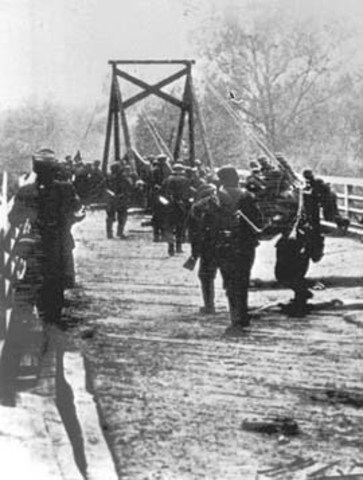 |
| German troops rush across a captured bridge, 22 June 1941. |
Battle of the Baltic: Heretofore a quiet German lake, the Baltic Sea becomes a contested battle zone as the Kriegsmarine and Luftwaffe join in the attacks on the Soviet Union.
German S-28 torpedoes and sinks Estonian freighter Estonia.
German S-59 and S-60 combine to torpedo and sinks Lithuanian freighter Gaisma.
German S-31 uses its deck guns to sink Estonian freighter Litsa.
German S-31 torpedoes and sinks Soviet freighter Shuka off Liepāja.
German S-44 torpedoes and sinks Soviet patrol boat MO-238 off Hanko.
Luftwaffe Junkers Ju 88 aircraft of 806 Küstenfliegergruppe bombs and sinks Soviet freighter Luga off Kronstadt.
The Luftwaffe bombs and sinks Soviet tugboat Perkunas.
Estonian freighter Ruhno hits a mine and sinks off Kronstadt.
 |
| German troops advancing, 22 June 1941. |
Battle of the Atlantic: U-77 (Oblt.z.S. Heinrich Schonder), on its first patrol out of Kiel, torpedoes and sinks (2379-ton British weather ship Arakaka about 450 nautical miles (520 miles, 830 km) east of St. John's. There are 45 deaths.
U-141 (Oblt.z.S. Philip Schüler), on its second patrol about 100 nautical miles (190 km, 120 miles) torpedoes and sinks 1277-ton Swedish freighter Calabria. There are three deaths and 21 survivors.
German raider Atlantis, disguised as Dutch freighter Brastagi, stops and sinks 5372-ton British freighter Balzac hundreds of miles east of Salvador, Brazil and west of Africa. There are three deaths, and the Atlantis takes 45 crew prisoner.
The Luftwaffe bombs and sinks Royal Navy transport HMT Beech at Scrabster, Caithness. There is one death.
U-48 completes its patrol career, returning to Kiel.
U-467 is laid down.
 |
| A reconnaissance Ju 88 D bomber of the 3/F, 22, June 1941. |
Battle of the Mediterranean: Royal Navy submarine HMS Union torpedoes and sinks 1004-ton Italian freighter Pietro Querini south of Pantelleria.
The Royal Navy mounts some supply missions to Tobruk, sending 758-ton British tanker Pass of Balmaha and 951-ton Greek store ship Antiliklia, both with a heavy escort. However, the Luftwaffe is dominating the skies and forces the Antiklia to take refuge in Mersa Matruh.
At Malta, a Bristol Blenheim bomber making an attack on an Axis convoy suffers severe damage. The pilot is badly wounded, so the observer, Sergeant JS Sargent, takes control and manages to get the plane back to Malta despite having no flying training.
 |
| Soviet searchlights illuminate the sky over Moscow, 22 June 1941. However, there are no Luftwaffe attacks - yet. |
German/Soviet Relations: German Foreign Minister Joachim Ribbentrop calls Soviet Ambassador Dekanozov to the Foreign Ministry at the Wilhelmstrasse. Once Dekanozov is there, Ribbentrop reads him a long-winded tirade accusing the Soviets of numerous offenses, and then sums up with a terse declaration of war. Ribbentrop then dismisses the Soviet ambassador.
In the morning, Reich Propaganda Minister Joseph Goebbels announces the invasion. He later quotes Hitler as saying:
At this moment a march is taking place that, for its extent, compares with the greatest the world has ever seen. I have decided today to place the fate and future of the Reich and our people in the hands of our soldiers. May God aid us, especially in this fight!
On the Soviet side, Stalin does not make any appearances either in person or over the radio on the 22nd. Instead, Foreign Minister Vyacheslav Molotov makes a radio broadcast around noontime:
Without a declaration of war, German forces fell on our country, attacked our frontiers in many places ... The Red Army and the whole nation will wage a victorious Patriotic War for our beloved country, for honor, for liberty ... Our cause is just. The enemy will be beaten. Victory will be ours!
After having gotten a few hours of sleep after staying up much of the night following the advance of the invasion, Hitler addresses the Reichstag. Giving a characteristically distorted account of the events leading up to the invasion ("For weeks constant [Soviet] violations of this frontier have taken place"), Hitler casts the battle as one for the preservation of Europe:
German and Rumanian soldiers are united under Chief of State Antonescu from the banks of the Pruth along the lower reaches of the Danube to the shores of the Black Sea. The task of this front, therefore, no longer is the protection of single countries, but the safeguarding of Europe and thereby the salvation of all.
Italy and Romania also declare war, while Hungary and Slovakia break relations with the USSR. Hungary's leader Admiral Horthy prefers to wait until the invasion proves itself before declaring war. So, he and his staff leave word that they have "gone fishing" (nobody is actually going fishing on such an eventful day). Finland does not declare war despite the fact that Wehrmacht troops are operating from its soil against the Soviet Union, the first of many lukewarm Finnish contributions to the invasion.
The Soviet NKVD orders all German embassy personnel, including Ambassador Schulenberg, to assemble in the embassy chancellery. This is standard practice in such situations, as much for the safety of embassy personnel as anything else, but it has an element of foreboding. Nobody is harmed. Schulenberg already has taken the precaution of sending his dog back home to Germany.
 |
| Smoke rising over Kovno from German shelling, June 22-25, 1941. Credit: George Kadish, photographer, Beit Hatefutsoth, Israel. |
German/Spanish Relations: Spanish Foreign Minister Serrano Suner telephones to inform Foreign Minister Ribbentrop that Spain would be happy to contribute a volunteer division - the "Blue" Division - for operations against the Soviet Union.
Anglo/Soviet Relations: British Prime Minister Winston Churchill makes a
radio broadcast in which he pledges all aid to the Soviet Union that Great Britain can provide:
Any man or State who fights against [Hitler] will have our aid. ... It follows, therefore, that we shall give whatever help we can to Russia and to the Russian people.
He also calls Hitler "this bloodthirsty guttersnipe" and, countering Hitler's pose as a defender of Europe from communism, states that Hitler's regime "is indistinguishable from the worst features of communism."
British Ambassador Sir Stafford Cripps is in Moscow and is able to coordinate the early stages of an alliance. Soviet Ambassador Maisky meets with Foreign Secretary Eden in London.
Soviet Military: The Stavka issues a general mobilization and proclaims martial law.
 |
| New York Times, 22 June 1941. |
German Military: The Wehrmacht issues a communique. Somewhat surprisingly, it focuses mainly on the western front, most likely because it does not want to give any useful information about Operation Barbarossa to the enemy.
Since the early morning hours of today, we have been engaged in hostilities along the Soviet Russian border. An attempt by enemy aircraft to fly into East Prussia, has been repelled with heavy losses. German fighter planes shot down large number of Red bombers. In the struggle against the British Isles, powerful German aerial formations bombed the harbour installations of Southampton last night. Extensive fires broke out in the docks, warehouses and food manufacturing works. Further air attacks were aimed at airfields in northern Scotland and the Midlands. A large British freight vessel was severely damaged by bombs north of Sunderland. Yesterday afternoon a small number of British bombers with powerful fighter cover flew against the French Channel coast. German fighter planes shot down 26 British aircraft in violent dogfights. German flak and naval artillery brought down two more enemy aircraft. [German ace] Lt. Col. Galland won three air victories in these struggles.
As usual, the Wehrmacht's figures are exaggerated, though the three victories cited for ace Adolf Galland are accurate. As if anybody needed a reminder, though, this emphasizes that the Reich is now in a two-front war.
 |
| A captured Red Army officer in Przemysl, on or about 22 June 1941. |
Finish Military: Finland has mobilized its entire military and is busy stationing units along the Soviet border. It is planning attacks toward Leningrad and the Svir River. Finnish ships continue laying mines in the Gulf of Finland. An infantry regiment and a light artillery battalion occupy the demilitarized Ahvenanmaa (Aland) islands in the Baltic Sea.
Finnish commandos, wearing civilian clothing, fly across the border in Luftwaffe Heinkel He 115s to see if they can cut off the Stalin canal. However, it is too heavily guarded, and the men return on foot back toward Finland. On the way, they cut (temporarily) the Murmansk railway. While the railway is a top objective throughout the war, this is the only time the Finns manage to seriously disrupt it for any length of time. In a sense, this is the high point of the war for the Finns in their repeated attempts to block this vital artery.
US Military: US Marines embark on ships bound for Iceland. They will take over occupation duties there from the 25,000 British troops.
U.S. Secretary of the Navy William F. "Frank" Knox personally conducts a memorial ceremony, held onboard submarine USS Triton (SS 201), over the last known location of the lost submarine USS O-9.
 |
| Foreign Minister Joachim von Ribbentrop, in the Bundesrat Hall of the Foreign Office in Berlin, read to the press on 22 June 1941 at 5 o'clock in the morning a note intended to justify the attack on the Soviet Union. Note the prominent picture of Hitler in the background. |
German Government: After finishing his business in Berlin, Hitler boards his command train Amerika. He sets out for his new military headquarters in the pine forests of East Prussia near the town of Rastenburg - the Wolf's Lair (Wolfsschanze). Hitler chooses that name on the train because it was his own code name during the 1920s. While he would be perfectly capable of running operations from Berlin, Hitler prefers to be seen as commanding the war effort "from the front."
Soviet Government: After he comes to accept that Germany has launched a full-scale invasion, Stalin loses his nerve. He appears (according to those present) as if he cannot make decisions. Stalin spends more time talking with his internal security chief, Lavrentiy Beria, and Foreign Minister Molotov than he does with his generals. This suggests that he is more concerned for the moment about protecting his own position as leader of the Soviet Union (or whatever will be left of it after the invasion) than figuring out how to stop the Germans. This begins a lengthy period in which Stalin retreats, makes no public appearances or speeches, but retains control of the government with an iron hand using the state security apparatus.
Lithuania: In conjunction with Operation Barbarossa, a popular rebellion breaks out called the June Uprising. The rebels seek a restoration of Lithuanian independence. There are hopes that German troops will help ensure this. The Lithuanian Activist Front seizes key installations in Kaunas, including the Presidential Palace, post office, telephone and telegraph, radio station and radiophone.
Holocaust: Romanian Jews from the Dorohoi district are transported in cattle cars to concentration camps in Tirgu and Craiova.
British Homefront: Taking advantage of the dramatic news about Operation Barbarossa, the British government releases casualty figures for the war to date. It states that the British armed forces have lost 18,627 killed, with civilian casualties totaling 35,756 dead. The RAF has lost 6,326 dead, 1338 wounded, 1879 missing and 408 taken as prisoners.
American Homefront: New York Yankee Joe DiMaggio gets two hits in five at-bats against the Detroit Tigers in New York. One of his hits is a home run. This extends his hitting streak to a club-record 35 games.
 |
| Moscow citizens listening to the announcement of the German attack on the Soviet Union, 22 June 1941. |
June 1941 June 1, 1941: Farhud PogromJune 2, 1941: Massacres on CreteJune 3, 1941: Kandanos MassacreJune 4, 1941: Kaiser Wilhelm Passes AwayJune 5, 1941: Death in ChungkingJune 6, 1941: Hitler's Commissar OrderJune 7, 1941: Commandos Strike at PessacJune 8, 1941: British Invade Syria and LebanonJune 9, 1941: Litani River BattleJune 10, 1941: British Take AssabJune 11, 1941: Hitler Thinking Beyond RussiaJune 12, 1941: St. James AgreementJune 13, 1941: Lützow DamagedJune 14, 1941: Latvian June DeportationsJune 15, 1941: Operation BattleaxeJune 16, 1941: The Old LionJune 17, 1941: British Spanked in North AfricaJune 18, 1941: Turkey Turns Its BackJune 19, 1941: Cheerios IntroducedJune 20, 1941: Birth of US Army Air ForceJune 21, 1941: Damascus FallsJune 22, 1941: Germany Invades RussiaJune 23, 1941: A Soviet KV Tank Causes HavocJune 24, 1941: Kaunas and Vilnius FallJune 25, 1941: Finland Declares WarJune 26, 1941: Bombing of KassaJune 27, 1941: Encirclement At MinskJune 28, 1941: Minsk FallsJune 29, 1941: Brest Fortress FallsJune 30, 1941: Mölders Becomes Top Ace2020





